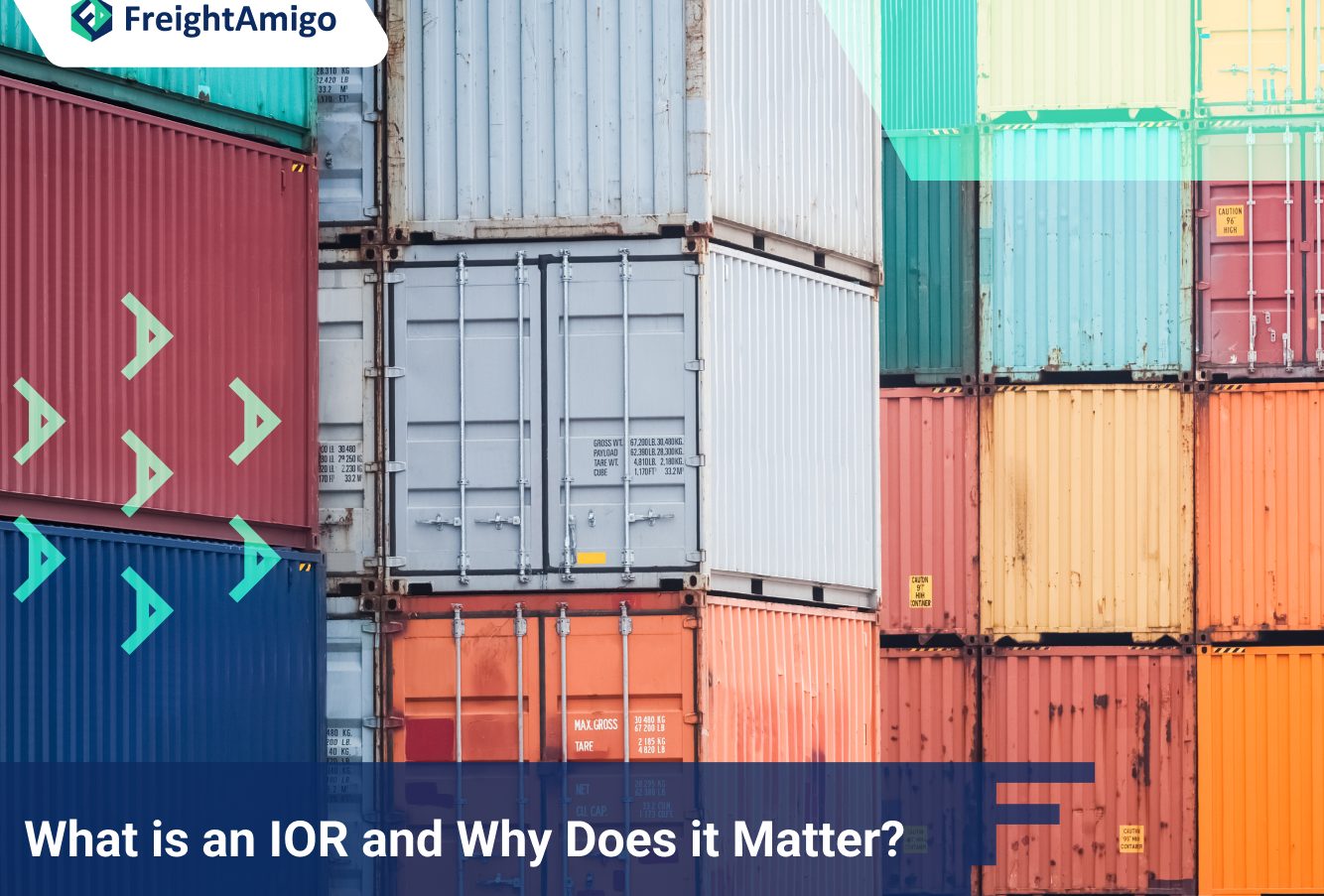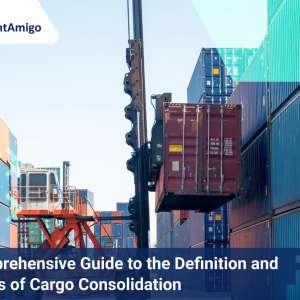What is an IOR and Why Does it Matter?
Latest update on 25 March, 2024 by Aiden Ng– Marketing Analyst at FreightAmigo
In the world of international trade, there are several key players involved, each with their own specific roles and responsibilities. One of these key players is the Importer of Record (IOR). But what exactly is an Importer of Record and why is it important? FreightAmigo helps demystify the concept of an Importer of Record and explores its importance in international trade in this article.
Want to compare the best Express, Air Freight, Sea Freight, Rail Freight & Trucking rates so as to have better control on cost?
The role of the Importer of Record (IOR)
An importer of record is a person or company that is legally responsible for ensuring that imported goods comply with all necessary regulations and requirements of the country of destination. This includes the payment of duties, taxes and other fees associated with the importation process. The Importer of Record acts as the official point of contact between the government authorities and the supplier or exporter.
The importer of record’s responsibilities vary depending on the country and the specific goods being imported. They may include obtaining the necessary import permits and licences, ensuring compliance with customs regulations, and providing accurate and complete documentation for the imported goods. Importers of Record may also be required to deal with any necessary inspections or audits by the customs authorities.
Why is an Importer of Record important in international trade?
Having a designated Importer of Record is important in international trade for a number of reasons. Firstly, it ensures compliance with the laws and regulations of the destination country. Importing goods without an Importer of Record can result in delays, fines or even confiscation of the goods. By appointing an Importer of Record, companies can avoid these potential pitfalls and ensure a smooth and efficient import process.
Secondly, an Importer of Record can help companies navigate the complex customs procedures and requirements of different countries. Each country has its own unique set of rules and regulations for importing goods. By working with an experienced Importer of Record, companies can use their knowledge and expertise to navigate these complexities and ensure a seamless import process.
Finally, an Importer of Record can provide companies with peace of mind and mitigate potential risks. By taking on the legal responsibility for compliance and documentation, an Importer of Record allows companies to focus on their core business without the added burden of dealing with customs procedures. This not only saves time and resources, but also minimises the risk of errors or oversights that could result in penalties or delays.
Understanding the responsibilities of an importer of record
The responsibilities of an Importer of Record can vary depending on the specific requirements of the destination country and the nature of the goods being imported. However, there are some common responsibilities that most Importers of Record are expected to fulfil.
Firstly, an Importer of Record is responsible for obtaining any necessary import permits or licences required by the destination country. This may involve completing application forms, providing supporting documentation and paying any associated fees. Importers of Record must ensure that all necessary permits and licences are obtained before goods are shipped to the destination country.
Secondly, an importer of record is responsible for ensuring compliance with customs regulations. This includes providing accurate and complete documentation for the imported goods, such as commercial invoices, packing lists and certificates of origin. Importers of Record must also ensure that the imported goods meet any applicable safety, quality or labelling standards set by the destination country.
In addition, an importer of record is responsible for paying any import duties, taxes or other charges levied by the destination country. These costs may vary depending on factors such as the value and nature of the goods and any preferential trade agreements in place. Importers of Record must accurately calculate and pay these fees to ensure the smooth release of the goods by the customs authorities.
Benefits of working with an Importer of Record
Working with an Importer of Record offers several benefits to companies involved in international trade. Firstly, it allows businesses to tap into the expertise and knowledge of professionals who are familiar with the customs procedures and regulations of different countries. This can help businesses navigate the complexities of international trade and ensure compliance with all necessary requirements.
Secondly, an Importer of Record can help companies save time and resources. By taking responsibility for customs procedures and documentation, an Importer of Record allows companies to focus on their core business. This can be particularly beneficial for small or medium-sized businesses that may not have the resources or expertise to handle these tasks in-house.
In addition, working with an Importer of Record can help businesses mitigate risk and avoid potential penalties or delays. Importing goods without proper compliance and documentation can result in fines, delays in customs clearance or even confiscation of the goods. By delegating these responsibilities to an Importer of Record, companies can minimise the risk of errors or oversights that could lead to such consequences.
Common misconceptions about the Importer of Record
Despite the importance and benefits of having an Importer of Record, there are some common misconceptions about the role. One such misconception is that only large multinational companies need an Importer of Record. In reality, companies of all sizes can benefit from working with an Importer of Record to help them navigate the complexities of customs procedures and ensure compliance.
Another misconception is that an Importer of Record is solely responsible for transporting the goods. While an importer of record may be involved in coordinating the logistics of the import process, their primary role is to ensure compliance with customs regulations and documentation requirements. The actual transportation of goods is often handled by freight forwarders or other logistics providers.
How to choose the right Importer of Record for your business
Choosing the right Importer of Record is crucial for companies involved in international trade. Here are some factors to consider when choosing an Importer of Record:
Experience and expertise
Look for an Importer of Record with a proven track record and extensive experience in the specific countries and industries relevant to your business. They should be familiar with the customs procedures and regulations of the destination countries.
Compliance and documentation
Ensure that the Importer of Record has a thorough understanding of the compliance and documentation requirements of the destination countries. They should be able to provide accurate and complete documentation for the imported goods.
Communication and responsiveness
Choose an Importer of Record that is responsive and communicates effectively. They should be able to provide timely updates on the status of the import process and address any questions or concerns promptly.
Cost-effectiveness
Consider the cost implications of working with an Importer of Record. While it is important to choose a reliable and experienced partner, it is also important to find a balance between cost and quality of service.
The legal and compliance aspects of being the importer of record
Importing goods across international borders involves a number of legal and compliance issues that an Importer of Record must address. These aspects include
Customs Regulations
Importers of Record must ensure compliance with the customs regulations of the destination country. This includes providing accurate and complete documentation, paying import duties and taxes, and complying with any applicable safety or quality standards.
Licences and permits
Importers of Record may be required to obtain certain licences or permits depending on the nature of the imported goods. This may include licences for restricted or regulated products such as pharmaceuticals or chemicals.
Trade Agreements
Importers of Record must be aware of any preferential trade agreements or customs regimes in place between the exporting and importing countries. This may affect the import duties or taxes payable and may require additional documentation or certification.
Record keeping
Importers of Record are usually required to keep records of all import transactions for a specified period of time. These records may include invoices, shipping documents, customs declarations and any other relevant documentation.
Conclusion: The value of an Importer of Record in international business
In conclusion, an Importer of Record plays a critical role in international trade by ensuring compliance with customs regulations, managing documentation requirements and mitigating risk for companies importing goods. By working with an experienced Importer of Record, companies can navigate the complexities of customs procedures, save time and resources, and focus on their core business. Choosing FreightAmigo could ensure you a seamless import process and successful international business ventures. So whether you are a small business or a multinational corporation, consider the value of an Importer of Record in your international trade endeavours.
To ensure a seamless import process and successful international business ventures, it is best to have the full support of logistics experts! To find out more about IOR, please visit the FreightAmigo enquiry page.
If you have any inquiries on logistics/supply chain, feel free to contact FreightAmigo now:
Chat with us online | Hotline: +852 28121686 | WhatsApp: +852 27467829



